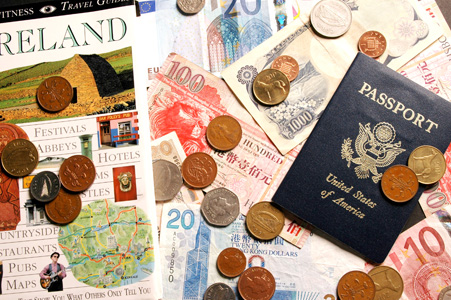
Experts advise keeping money, credit cards divided while
traveling
It’s happened to the best of us. You are going along
– enjoying time off work on a tropical island, in an ancient
Greek city or maybe just south of the border for a weekend getaway
– when you realize things aren’t where they should be. Your wallet
is missing – or a credit card or a passport – and panic sets in,
especially if you are overseas w
ith the complications that can create in canceling accounts.
Experts advise keeping money, credit cards divided while traveling
It’s happened to the best of us. You are going along – enjoying time off work on a tropical island, in an ancient Greek city or maybe just south of the border for a weekend getaway – when you realize things aren’t where they should be. Your wallet is missing – or a credit card or a passport – and panic sets in, especially if you are overseas with the complications that can create in canceling accounts.
The first time I traveled overseas, for a study abroad program in Ireland, I foolishly walked the city streets with a backpack stuffed to the hilt, my wallet precariously placed in the front zipper pocket. I walked along the busy city streets of Dublin with a gaggle of fellow American students and two Irish orientation leaders who taught us the ins and out of etiquette and Irish culture – at least as much as you can learn in a five-hour session.
After one day of orientation, I’d walked 15 city blocks before I realized my wallet; my travelers’ checks, my credit cards and a palm pilot were missing. The zipper pocket on my backpack was opened and the contents were gone. My orientation leader helped me trace the steps back to our hotel in hopes the wallet just “fell out” somewhere along the way. I held back tears of panic as we searched for my goods, missing out on the tour of the Guinness Brewery.
I called home collect – my phone card had been in the lost wallet – and my mother wired me enough money to tied me over until I could get my travelers checks replaced and canceled my credit cards. The companies were understanding and rushed a reissue of the cards, which my mother expressed mailed to me at my final destination in Coleraine, Northern Ireland, where I would study for three months.
In the end, things worked out, but the weeks of stress and worry about money in a foreign country could have been avoided with a few simple tips offered by the experts.
“You can buy these things now – we used to make things – where you put things any place a person doesn’t see them,” said Eleanor Frusetta, a travel agent, of items such as under-the-shirt neck pouches. “Even fanny packs – they can cut them off. Don’t put [wallets] in the back pocket were slippery fingers will take them out.”
In 45 years as a travel agent with Gilroy Travel, she has heard her share of horror stories about valuables gone missing. Her agency provides a safety sheet for travelers, which includes keeping credit cards or passports with you at all times.
Clearing out wallets of unneeded items and photocopying credit cards that will accompany travelers is the top tip from Paul Stephens, a policy analyst with the Privacy Rights Clearinghouse in San Diego. Photocopies left with family or friends can be used to quickly contact credit card companies to report missing cards.
Local travel agent and owner of FAST Travel in Hollister, Linda Daughenbaugh tells her clients to use common sense.
“Just be smart,” she said.
Backpacks – like the one that got me in trouble in the Emerald Isle – are a no-no for travelers, Daughenbaugh said.
“They can be opened from the back,” she said.
She also suggested that clients traveling overseas use a credit card because they can get the best exchange rate while there.
Another expert suggested the “divide and conquer” strategy when traveling. Nancy Dunman, the editor of the “TravelSmart” newsletter, suggested keeping credit cards in different places.
“Your natural reflex is to put everything in one place, but it’s better to have your main credit card in one place and your backup card in another,” Dunman said. “That way, if a thief gets one – or you lose something – you have an alternative.”
In addition to being cautious when they arrive at their destinations, travelers should keep extra cash or important items with them in carryon luggage rather than in checked baggage.
“Dishonest security personnel or baggage handlers can find it,” Dunman said.
Frusetta believes the tips she offers to clients have cut down on the thefts reported back to her.
“It’s kind of just getting to know everything and getting used to traveling,” she said. “Be alert.”
The Associated Press contributed to this report.









